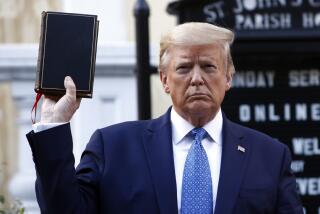Would Romney be ‘most religious’ president? What about Carter?
If Mitt Romney wins the Nov. 6 election, would he become our most religious president? It’s an odd question, but one that has come up in recent days after writer Nicholas Lemann said as much in a profile of Romneythat ran in the New Yorker magazine.
“If elected,” Lemann wrote, “Romney, scion of an old, distinguished Mormon family (his ancestors had a direct connection to Joseph Smith and Brigham Young), would arguably be the most actively religious president in American history.”
There are a couple of key qualifiers there -- the use of the words “arguably” and “actively.” Still, the claim begs a question -- in fact, more than one. What president would Romney displace from the title of most religious? What, exactly, does that mean? And how can anyone tell?
“I have to admit, when I first saw it, I thought, ‘Really?’ I mean, how do you know?” said Steve Shaw, a professor of political science at Northwest Nazarene University in Nampa, Idaho, and coauthor of “The Presidents & Their Faith: From George Washington to Barack Obama.”
Slate magazine suggested, perhaps not surprisingly, that Jimmy Carter might be the current title holder. Carter, a Baptist Sunday school teacher, was the first president to declare himself to have been born again (and to have lusted in his heart) and was known as a president whose policies were often guided by faith -- not always to positive political ends. “It’s impossible to know the contents of a man’s heart, but historians who study the religious lives of the presidents point again and again to the words and deeds of James Earl Carter Jr.,” Slate wrote.
Who else? James A. Garfield, a member of the Disciples of Christ, was the only president who had been a pastor. When he left his ministry for the White House, he declared, “I resign the highest office in the land to become president of the United States.”
Alas, it didn’t go well for him: Garfield was shot four months into his term in 1881, and died several months later.
William McKinley was an apparently devout Methodist who disappointed his mother when he went into politics, not the ministry. Nevertheless, he remained active in his church throughout his life. Richard Nixon was another president whose mother had higher aspirations for her son: Hannah Nixon thought young Richard should become a Quaker missionary.
“The last thing my mother, a devout Quaker, wanted me to do was go into the warfare of politics,” he would later write. Although Nixon described himself as a lifelong Quaker, he did not -- to put it mildly -- wear his faith on his sleeve.
Shaw observed that some of the presidents most associated with deep faith -- for instance, Abraham Lincoln, Ronald Reagan and George W. Bush -- were not regular church-goers and might not meet the criteria of being “actively religious.”
Lincoln, in fact, never belonged to a church and expressed doubt about the divinity of Jesus. If he were to run for president today, Shaw said, “He would be seen as, at best, agnostic ... and probably wouldn’t survive the primaries.” Yet he also wrote some of the most profound theological statements in the nation’s history, with his Second Inaugural Address the best-known example.
In it, he acknowledged the hard truth that both sides in the Civil War had beseeched aid from the same God. “The prayers of both could not be answered; that of neither has been answered fully. The Almighty has His own purposes,” he said.
Franklin D. Roosevelt also evoked God often in his speeches and was known to keep the Book of Common Prayer by his bedside. But although he had a lifelong affiliation with the Episcopal Church, he wasn’t much of a church-goer. The same might be said of Harry S. Truman, Shaw said.
“These guys were political animals,” not theologians, he said.
Barack Obama has been fiercely attacked on religious grounds -- pilloried as a Muslim, despite his insistence that he is Christian; and derided for being the wrong kind of Christian, whose former pastor in the United Church of Christ was the controversial Rev. Jeremiah Wright.
In this, he is far from alone, Shaw said. A number of presidents have been accused of lacking faith, or practicing the wrong sort of Christianity, or of not being Christian at all. “Washington was attacked, Jefferson was, Lincoln was,” Shaw said. “It’s nothing new. We’ve had a lot of practice with this.”
Romney, of course, would be the first Mormon president, and he has been subjected to intense scrutiny -- and some skepticism -- because of that. If religiosity is determined by church attendance, he almost certainly would be among the most religious presidents. He rarely, if ever, misses Sunday services, and has been both a missionary and a bishop in his church -- in effect, a pastor. Faith clearly runs deeply through his life.
But more religious than Carter or Garfield, McKinley or Lincoln? Perhaps that determination can be left to a higher authority.
mitchell.landsberg@latimes.com
Twitter: @LATlands
Follow Politics Now on Twitter and Facebook
More to Read
Get the L.A. Times Politics newsletter
Deeply reported insights into legislation, politics and policy from Sacramento, Washington and beyond. In your inbox three times per week.
You may occasionally receive promotional content from the Los Angeles Times.










